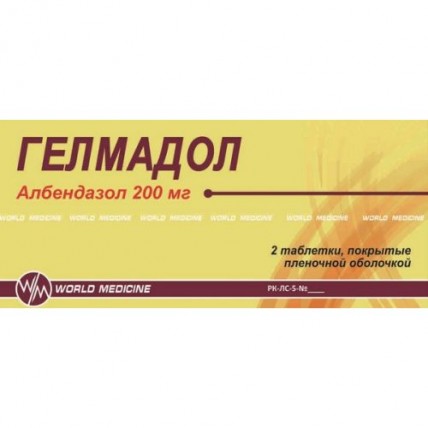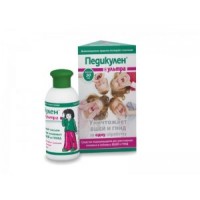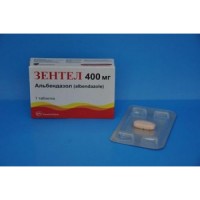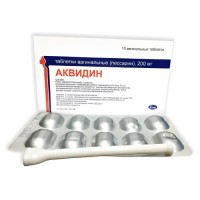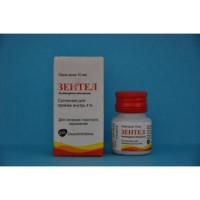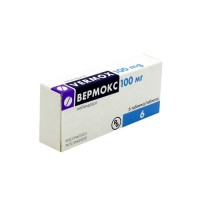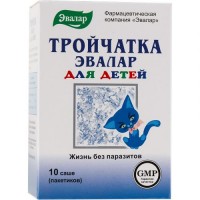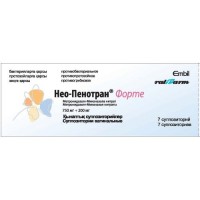Gelmadol 2's 200 mg film-coated tablets
- $18.10
Trade name
Gelmadol
Mezhdunarodnoye the unlicensed
name Albendazol Lekarstvennaya
the Tablet form, film coated, 200 mg
Structure
One tablet contains
active agent - albendazol micronized 200 mg,
excipients: lactoses monohydrate, starch corn, magnesium stearate, sodium krakhmalaglikolat (type A), poliplasidon XL, K25 polyvinylpirrolidone, sodium the lauryl sulfate, talc purified.
Structure of a film cover: hydroxymethyl cellulose 2910, polyethyleneglycol 20000, titan dioxide (E171).
The description
of the Tablet, film coated white color, round shape, with a biconvex surface, smooth, flavourless.
Pharmacotherapeutic group
Anthelminthic drugs. Drugs, for treatment of a nematodosis. Benzimidazole derivatives. Albendazol.
The ATX P02CA03 code
the Pharmacological
Pharmacokinetics Absorption Later properties of administration of drug inside is badly absorbed in digestive tract, in an invariable look is not defined in blood plasma. Bioavailability at intake low. Intake of greasy food increases absorption and the maximum concentration by 5 times.
Metabolism
Albendazol quickly turns in a liver into primary metabolite – an albendazol sulphoxide which also has anthelminthic activity.
Distribution
the Maximum concentration in blood plasma of an albendazol of sulphoxide is reached in 2-5 hours after reception. For 70% the metabolite is connected with proteins of plasma and completely extends on an organism: it is found in urine, bile, a liver, in walls of a cyst and cystous liquid, cerebrospinal fluid, gets into a wall and contents of cysts of helminths.
Albendazol's removal sulphoxide in a liver turns into an albendazol sulphone (secondary metabolite) and other oxidized products. Elimination half-life of an albendazol of sulphoxide – 8.5 hour. It is removed with bile in the form of various metabolites.
Removal through kidneys of an albendazol and albendazol of sulphoxide insignificant. At patients with a renal failure the clearance does not change.
At patients with damage of a liver – the bioavailability increases, the maximum concentration of an albendazol of sulphoxide in blood plasma increases twice, and the half-life period is extended.
Albendazol induces R-450IA cytochrome in cells of a liver of the person, accelerates metabolism of many medicines.
The pharmacodynamics
Gelmadol is antiprotozoan and protivogelmintny drug which pharmacological properties are caused by effect of active agent - an albendazola. The mechanism of action of an albendazol – its ability causes disorder of function of the microtubular device in a helminth organism that leads to his death and removal from a human body.
Albendazol is effective concerning the majority of intestinal nematodoses: Ascaris lumbricoides, Trichuris trichiura, Enterobius vermicularis, Ancylostoma duodenale, Necator americanus, Strongyloides stercoralis, Larva Migrans, tsestod: Hymenolesis nana (dwarfish tapeworm), Taenia solium (pork tapeworm), Taenia saginata (bull tapeworm), trematod: Opisthorchis viverrini, Clonorchis sinensis, the elementary: Giardia lamblia.
Gelmadol is active concerning tissue parasites, including the cystic echinococcosis and alveolar echinococcosis caused by an invasion of Echinococcus granulosus and Echinococcus multilocularis respectively. It is effective at treatment of the neurocysticercosis caused by an invasion of larvae of a pork tapeworm of T. solium, the kapillyarioz caused by Capillaria philippinensis, and a gnatostomoza, caused by Gnathostoma spinigerum invasion. Albendazol as antiparasitic drug possesses enough broad spectrum of activity.
Indications
- an enterobiosis
- ankilostomidoz and a necatoriasis
- a hymenolepiasis
- a teniosis
- a strongyloidosis
- an ascaridosis
- a trichuriasis
- an opisthorchosis
- a skin syndrome of Larva Migrans
- cystous echinococcosis (hepatic, alveolar, peritoneal)
- neurocysticercosis
- an intestines nematodosis
- a trichinosis
- toksokaroz
- a giardiasis.
The route of administration and doses
take the Drug inside, in time or after meal. Special preparation and diet is not required. Use of laxative drugs is not necessary.
Some patients can have difficulties with ingestion of a tablet, in such cases the tablet can be chewed and washed down with a small amount of water or to pound.
If there does not occur recovery in three weeks, the second year of treatment is appointed.
The dose of drug is established individually, depending on a type of an invasion, body weight of the patient.
The maximum daily dose - 600 mg.
In an ascaridosis, a trichuriasis – Gelmadol appoint by the patient with body weight less than 60 kg and more - 400 mg a day once or in 2 receptions, the patient with body weight less than 60 kg – 15 mg/kg a day in 2 receptions.
At an enterebioza drug appoint in a dose 5 mg/kg of body weight once. In 14 days it is necessary to repeat a course of treatment in the same dose and in the same mode.
In a strongyloidosis, an ankilostomidoza Gelmadol appoint in a dose 10 mg/kg of body weight once within 3 days. In a week it is recommended to carry out a treatment recycle in the same doses.
In a trichinosis drug appoint in a dose 10 mg/kg of body weight a day in 2 receptions within 7-10 days. At a heavy invasion and organ defeats (myocarditis, a pneumonitis, an encephalomeningitis) also glucocorticosteroid and symptomatic means are appointed.
Treatment of a toksokaroz. Gelmadol appoint in a dose 10 mg/kg of body weight a day in 2 receptions after a meal within 10 days. Carrying out repeated courses of treatment at an interval of 2 weeks/month is required. In the course of treatment control of peripheral blood (once in 5-7 days) and aminotransferases in the same terms.
Treatment of gidatidozny echinococcosis. Before prescribing of drug the complete blood count test, biochemical blood test (hepatonephric complex) is necessary. Treatment is carried out at normal laboratory indicators. Gelmadol appoint in a dose 10 mg/kg of body weight in 2-3 receptions. Duration of a course of treatment – 3 cycles for 28 days with the 14th day break between cycles. In the course of treatment each 5-7 days the test of blood and aminotransferases is conducted. At decrease in leukocytes it is lower than 3.0х109 l and 5-6 multiple increases in level of aminotransferases it is necessary to suspend treatment before normalization or considerable improvement of indicators.
Purpose of gepatoprotektor during treatment and in cases of toxic manifestations is ineffective, drug withdrawal is necessary.
Treatment by chemotherapy of alveolar echinococcosis is an additional tool. Doses and the mode of prescribing of drug same, as well as in gidatidozny echinococcosis. Duration and a course of treatment is defined by a condition of the patient and tolerance of drug.
In cysticercosis Gelmadol appoint in a dose 15 mg/kg of body weight in 3 receptions. Duration of a course is 28-30 days. In 2 days prior to administration of drug in the first week of reception appoint glucocorticosteroid means. Before treatment, in the course of administration of drug and upon termination of carry out the same control, as at treatment of echinococcosis.
Cystous echinococcosis.
Gelmadol is appointed in a case:
- inoperable pathology,
- before surgery,
- in the post-operational period when the course of preoperative therapy was too short or viable cysts are found,
- after chrezkozhny drainage of cysts in the diagnostic or therapeutic purposes.
The course of treatment makes 28 days.
A giardiasis on 400 mg once a day within 5 days.
At an inoperable form of peritoneal cysts, cysts in lungs and a liver three 28-day cycles of treatment divided by a 14-day break in administration of drug are recommended. In the presence of cysts in a brain and bones longer course of therapy can be required.
Before operation two 28-day cycles divided by a 14-day break in administration of drug are recommended. If surgical intervention is necessary until the termination of a two-cyclic course, Gelmadol has to be accepted until surgery.
If the presurgical course was less than 14 days or viable cysts are found, then after operation carry out two cycles for 28 days divided by a 14-day break in administration of drug.
Alveolar echinococcosis. Duration of treatment is 28 days. The second 28-day year is repeated after a two-week break in administration of drug. Treatment can be continued within several months or years.
Elderly patients
of Correction of a dose it is not required, however patients should be careful when assigning with abnormal liver functions.
A renal failure
Influence of renal pathology on renal clearance is improbable. However, at patients with a renal failure it is necessary to carry out monitoring of function of kidneys at Gelmadol's appointment.
The liver failure
Because albendazol it is quickly metabolized by means of hepatic metabolism to primary metabolite of an albendazol of sulphoxide, an abnormal liver function has considerable impact on pharmacokinetics of an albendazol of sulphoxide. Patients with disturbance of indicators of hepatic tests (transaminases) have to be carefully examined until prescribing of the drug Gelmadol.
Side effects
According to manifestation frequency side reactions are defined as very frequent (& gt, 1/10), frequent (& gt, 1/100, & lt, 1/10), sometimes (& gt, 1/1000, & lt, 1/100), rare (≥1/10, 000 and & lt, 1/1000), very rare (& lt, 1/10, 000).
Short-term therapy by low doses
Sometimes
- a headache and dizziness
- pain in the field of epigastrium or a stomach, nausea, vomiting and diarrhea
Seldom
- reactions of hypersensitivity, including rash, an itching and urticaria
- increase in level of liver enzymes
is Very rare
- a multiformny erythema, Stephenson-Johnson's syndrome
Long-term therapy by high doses
Very often
- a headache
- slight or moderate increase of level of hepatic enzymes
Is frequent
- dizziness
- an abdominal pain, nausea, vomiting and diarrhea (at treatment of echinococcosis)
- a reversible alopecia (poredeniye and moderate loss of hair)
- fever
Sometimes
- reactions of hypersensitivity, including rash, an itching and urticaria
- a leukopenia
- hepatitis
- increase in the ABP
- meningitis
- symptoms of a renal failure
Is very rare
- a leukopenia, a granulocytopenia, thrombocytopenia
- a pancytopenia, aplastic anemia, an agranulocytosis
Patients with liver pathology, including hepatic echinococcosis, are more predisposed to suppression of a funtskiya of marrow.
- a multiformny erythema, Stephenson-Johnson's syndrome
of the Contraindication
- hypersensitivity to components of drug and other components of drug.
- pregnancy, the period of a lactation (breastfeeding)
- children's age up to 6 years
- hereditary intolerance of fructose, deficiency of Lapp-lactases enzyme, glucose galactose malabsorption
- eye retina pathology.
Medicinal interactions
Dexamethasone and Cimetidinum increase concentration of an albendazol of sulphoxide in blood.
Ritonavir, Phenytoinum, carbamazepine and phenobarbital can potentially reduce plasma concentration of an active metabolite of an albendazol – an albendazol of sulphoxide. The clinical value of this fact is unknown, however can affect Gelmadol's efficiency, especially at treatment of system helminthoses. Patients have to be under observation of the doctor regarding efficiency of treatment that can demand purpose of the alternative mode of dosing or revision of the carried-out therapy.
Special instructions
in the course of treatment of patients the drug Gelmadol can existence at them the existing neurocysticercosis will come to light, especially patients in a zone with high degree have a spread of tenozny infections. At the patients who are treated for a neurotsistitsirkoz and system gelmintny infections the neurologic symptoms against the background of Gelmadol's reception connected with death of parasites can be shown. Spasms, increase in intracranial pressure and focal neurologic symptoms belong to these symptoms. Symptoms can be shown right after the beginning of therapy and demand immediate treatment by steroids and antikolvulsant. Oral or intravenous corticosteroids are recommended for use at the beginning of the first week of therapy for prevention of episodes of intracranial hypertensia.
At drug use perhaps weak or moderate increase in level of hepatic enzymes which are normalized after the termination of reception of Gelmadol.
In the course of therapy, cases of development of hepatitis were revealed. Definition of indicators of function of a liver has to be carried out before each cycle of treatment and each two weeks during treatment. If indicators of transaminases increase twice and more, Gelmadol it is necessary to cancel. Treatment is resumed when indicators of function of a liver return to norm, but patients have to be under observation of the attending physician.
Gelmadol can cause suppression of function of marrow in this connection blood tests have to be made at the beginning and each two weeks during each 28-day cycle. Patients with liver diseases, including hepatic echinococcosis, have more expressed tendency to suppression of function of marrow conducting to a pancytopenia, aplastic anemia, an agranulocytosis and a leukopenia that demands careful monitoring of a picture of blood. At clinically significant decrease in level of uniform elements of blood, Gelmadol it is necessary to cancel.
Pregnancy
the Drug Gelmadol is contraindicated in the presence of the existing, assumed or planned pregnancy. In order to avoid Gelmadol's appointment during early pregnancy, the woman of childbearing age have to begin therapy only after the negative test for pregnancy which has to be repeated at least once prior to the beginning of the following cycle. Observance of reliable measures of contraception throughout all cycle of treatment and in addition for a month after its termination is necessary.
Features of influence of medicine on ability to run the vehicle or potentially dangerous mechanisms
As drug causes such by-effects as dizziness, the care at control of motor transport and work with moving mechanisms is necessary.
Overdose
Symptoms: strengthening of side effects.
Treatment: gastric lavage, prescribing of activated carbon, symptomatic therapy.
The form of release and packing
On 2 tablets place in blister strip packaging from a film of polyvinylchloride and aluminum foil.
On 1 planimetric packing together with the instruction for medical use in the state and Russian languages put in a pack from cardboard.
To Store storage conditions at a temperature not over 250C.
To store out of children's reach!
3 years
not to apply a period of storage after an expiration date.
To Develop prescription status According to the prescription
Gelmadol
Mezhdunarodnoye the unlicensed
name Albendazol Lekarstvennaya
the Tablet form, film coated, 200 mg
Structure
One tablet contains
active agent - albendazol micronized 200 mg,
excipients: lactoses monohydrate, starch corn, magnesium stearate, sodium krakhmalaglikolat (type A), poliplasidon XL, K25 polyvinylpirrolidone, sodium the lauryl sulfate, talc purified.
Structure of a film cover: hydroxymethyl cellulose 2910, polyethyleneglycol 20000, titan dioxide (E171).
The description
of the Tablet, film coated white color, round shape, with a biconvex surface, smooth, flavourless.
Pharmacotherapeutic group
Anthelminthic drugs. Drugs, for treatment of a nematodosis. Benzimidazole derivatives. Albendazol.
The ATX P02CA03 code
the Pharmacological
Pharmacokinetics Absorption Later properties of administration of drug inside is badly absorbed in digestive tract, in an invariable look is not defined in blood plasma. Bioavailability at intake low. Intake of greasy food increases absorption and the maximum concentration by 5 times.
Metabolism
Albendazol quickly turns in a liver into primary metabolite – an albendazol sulphoxide which also has anthelminthic activity.
Distribution
the Maximum concentration in blood plasma of an albendazol of sulphoxide is reached in 2-5 hours after reception. For 70% the metabolite is connected with proteins of plasma and completely extends on an organism: it is found in urine, bile, a liver, in walls of a cyst and cystous liquid, cerebrospinal fluid, gets into a wall and contents of cysts of helminths.
Albendazol's removal sulphoxide in a liver turns into an albendazol sulphone (secondary metabolite) and other oxidized products. Elimination half-life of an albendazol of sulphoxide – 8.5 hour. It is removed with bile in the form of various metabolites.
Removal through kidneys of an albendazol and albendazol of sulphoxide insignificant. At patients with a renal failure the clearance does not change.
At patients with damage of a liver – the bioavailability increases, the maximum concentration of an albendazol of sulphoxide in blood plasma increases twice, and the half-life period is extended.
Albendazol induces R-450IA cytochrome in cells of a liver of the person, accelerates metabolism of many medicines.
The pharmacodynamics
Gelmadol is antiprotozoan and protivogelmintny drug which pharmacological properties are caused by effect of active agent - an albendazola. The mechanism of action of an albendazol – its ability causes disorder of function of the microtubular device in a helminth organism that leads to his death and removal from a human body.
Albendazol is effective concerning the majority of intestinal nematodoses: Ascaris lumbricoides, Trichuris trichiura, Enterobius vermicularis, Ancylostoma duodenale, Necator americanus, Strongyloides stercoralis, Larva Migrans, tsestod: Hymenolesis nana (dwarfish tapeworm), Taenia solium (pork tapeworm), Taenia saginata (bull tapeworm), trematod: Opisthorchis viverrini, Clonorchis sinensis, the elementary: Giardia lamblia.
Gelmadol is active concerning tissue parasites, including the cystic echinococcosis and alveolar echinococcosis caused by an invasion of Echinococcus granulosus and Echinococcus multilocularis respectively. It is effective at treatment of the neurocysticercosis caused by an invasion of larvae of a pork tapeworm of T. solium, the kapillyarioz caused by Capillaria philippinensis, and a gnatostomoza, caused by Gnathostoma spinigerum invasion. Albendazol as antiparasitic drug possesses enough broad spectrum of activity.
Indications
- an enterobiosis
- ankilostomidoz and a necatoriasis
- a hymenolepiasis
- a teniosis
- a strongyloidosis
- an ascaridosis
- a trichuriasis
- an opisthorchosis
- a skin syndrome of Larva Migrans
- cystous echinococcosis (hepatic, alveolar, peritoneal)
- neurocysticercosis
- an intestines nematodosis
- a trichinosis
- toksokaroz
- a giardiasis.
The route of administration and doses
take the Drug inside, in time or after meal. Special preparation and diet is not required. Use of laxative drugs is not necessary.
Some patients can have difficulties with ingestion of a tablet, in such cases the tablet can be chewed and washed down with a small amount of water or to pound.
If there does not occur recovery in three weeks, the second year of treatment is appointed.
The dose of drug is established individually, depending on a type of an invasion, body weight of the patient.
The maximum daily dose - 600 mg.
In an ascaridosis, a trichuriasis – Gelmadol appoint by the patient with body weight less than 60 kg and more - 400 mg a day once or in 2 receptions, the patient with body weight less than 60 kg – 15 mg/kg a day in 2 receptions.
At an enterebioza drug appoint in a dose 5 mg/kg of body weight once. In 14 days it is necessary to repeat a course of treatment in the same dose and in the same mode.
In a strongyloidosis, an ankilostomidoza Gelmadol appoint in a dose 10 mg/kg of body weight once within 3 days. In a week it is recommended to carry out a treatment recycle in the same doses.
In a trichinosis drug appoint in a dose 10 mg/kg of body weight a day in 2 receptions within 7-10 days. At a heavy invasion and organ defeats (myocarditis, a pneumonitis, an encephalomeningitis) also glucocorticosteroid and symptomatic means are appointed.
Treatment of a toksokaroz. Gelmadol appoint in a dose 10 mg/kg of body weight a day in 2 receptions after a meal within 10 days. Carrying out repeated courses of treatment at an interval of 2 weeks/month is required. In the course of treatment control of peripheral blood (once in 5-7 days) and aminotransferases in the same terms.
Treatment of gidatidozny echinococcosis. Before prescribing of drug the complete blood count test, biochemical blood test (hepatonephric complex) is necessary. Treatment is carried out at normal laboratory indicators. Gelmadol appoint in a dose 10 mg/kg of body weight in 2-3 receptions. Duration of a course of treatment – 3 cycles for 28 days with the 14th day break between cycles. In the course of treatment each 5-7 days the test of blood and aminotransferases is conducted. At decrease in leukocytes it is lower than 3.0х109 l and 5-6 multiple increases in level of aminotransferases it is necessary to suspend treatment before normalization or considerable improvement of indicators.
Purpose of gepatoprotektor during treatment and in cases of toxic manifestations is ineffective, drug withdrawal is necessary.
Treatment by chemotherapy of alveolar echinococcosis is an additional tool. Doses and the mode of prescribing of drug same, as well as in gidatidozny echinococcosis. Duration and a course of treatment is defined by a condition of the patient and tolerance of drug.
In cysticercosis Gelmadol appoint in a dose 15 mg/kg of body weight in 3 receptions. Duration of a course is 28-30 days. In 2 days prior to administration of drug in the first week of reception appoint glucocorticosteroid means. Before treatment, in the course of administration of drug and upon termination of carry out the same control, as at treatment of echinococcosis.
Cystous echinococcosis.
Gelmadol is appointed in a case:
- inoperable pathology,
- before surgery,
- in the post-operational period when the course of preoperative therapy was too short or viable cysts are found,
- after chrezkozhny drainage of cysts in the diagnostic or therapeutic purposes.
The course of treatment makes 28 days.
A giardiasis on 400 mg once a day within 5 days.
At an inoperable form of peritoneal cysts, cysts in lungs and a liver three 28-day cycles of treatment divided by a 14-day break in administration of drug are recommended. In the presence of cysts in a brain and bones longer course of therapy can be required.
Before operation two 28-day cycles divided by a 14-day break in administration of drug are recommended. If surgical intervention is necessary until the termination of a two-cyclic course, Gelmadol has to be accepted until surgery.
If the presurgical course was less than 14 days or viable cysts are found, then after operation carry out two cycles for 28 days divided by a 14-day break in administration of drug.
Alveolar echinococcosis. Duration of treatment is 28 days. The second 28-day year is repeated after a two-week break in administration of drug. Treatment can be continued within several months or years.
Elderly patients
of Correction of a dose it is not required, however patients should be careful when assigning with abnormal liver functions.
A renal failure
Influence of renal pathology on renal clearance is improbable. However, at patients with a renal failure it is necessary to carry out monitoring of function of kidneys at Gelmadol's appointment.
The liver failure
Because albendazol it is quickly metabolized by means of hepatic metabolism to primary metabolite of an albendazol of sulphoxide, an abnormal liver function has considerable impact on pharmacokinetics of an albendazol of sulphoxide. Patients with disturbance of indicators of hepatic tests (transaminases) have to be carefully examined until prescribing of the drug Gelmadol.
Side effects
According to manifestation frequency side reactions are defined as very frequent (& gt, 1/10), frequent (& gt, 1/100, & lt, 1/10), sometimes (& gt, 1/1000, & lt, 1/100), rare (≥1/10, 000 and & lt, 1/1000), very rare (& lt, 1/10, 000).
Short-term therapy by low doses
Sometimes
- a headache and dizziness
- pain in the field of epigastrium or a stomach, nausea, vomiting and diarrhea
Seldom
- reactions of hypersensitivity, including rash, an itching and urticaria
- increase in level of liver enzymes
is Very rare
- a multiformny erythema, Stephenson-Johnson's syndrome
Long-term therapy by high doses
Very often
- a headache
- slight or moderate increase of level of hepatic enzymes
Is frequent
- dizziness
- an abdominal pain, nausea, vomiting and diarrhea (at treatment of echinococcosis)
- a reversible alopecia (poredeniye and moderate loss of hair)
- fever
Sometimes
- reactions of hypersensitivity, including rash, an itching and urticaria
- a leukopenia
- hepatitis
- increase in the ABP
- meningitis
- symptoms of a renal failure
Is very rare
- a leukopenia, a granulocytopenia, thrombocytopenia
- a pancytopenia, aplastic anemia, an agranulocytosis
Patients with liver pathology, including hepatic echinococcosis, are more predisposed to suppression of a funtskiya of marrow.
- a multiformny erythema, Stephenson-Johnson's syndrome
of the Contraindication
- hypersensitivity to components of drug and other components of drug.
- pregnancy, the period of a lactation (breastfeeding)
- children's age up to 6 years
- hereditary intolerance of fructose, deficiency of Lapp-lactases enzyme, glucose galactose malabsorption
- eye retina pathology.
Medicinal interactions
Dexamethasone and Cimetidinum increase concentration of an albendazol of sulphoxide in blood.
Ritonavir, Phenytoinum, carbamazepine and phenobarbital can potentially reduce plasma concentration of an active metabolite of an albendazol – an albendazol of sulphoxide. The clinical value of this fact is unknown, however can affect Gelmadol's efficiency, especially at treatment of system helminthoses. Patients have to be under observation of the doctor regarding efficiency of treatment that can demand purpose of the alternative mode of dosing or revision of the carried-out therapy.
Special instructions
in the course of treatment of patients the drug Gelmadol can existence at them the existing neurocysticercosis will come to light, especially patients in a zone with high degree have a spread of tenozny infections. At the patients who are treated for a neurotsistitsirkoz and system gelmintny infections the neurologic symptoms against the background of Gelmadol's reception connected with death of parasites can be shown. Spasms, increase in intracranial pressure and focal neurologic symptoms belong to these symptoms. Symptoms can be shown right after the beginning of therapy and demand immediate treatment by steroids and antikolvulsant. Oral or intravenous corticosteroids are recommended for use at the beginning of the first week of therapy for prevention of episodes of intracranial hypertensia.
At drug use perhaps weak or moderate increase in level of hepatic enzymes which are normalized after the termination of reception of Gelmadol.
In the course of therapy, cases of development of hepatitis were revealed. Definition of indicators of function of a liver has to be carried out before each cycle of treatment and each two weeks during treatment. If indicators of transaminases increase twice and more, Gelmadol it is necessary to cancel. Treatment is resumed when indicators of function of a liver return to norm, but patients have to be under observation of the attending physician.
Gelmadol can cause suppression of function of marrow in this connection blood tests have to be made at the beginning and each two weeks during each 28-day cycle. Patients with liver diseases, including hepatic echinococcosis, have more expressed tendency to suppression of function of marrow conducting to a pancytopenia, aplastic anemia, an agranulocytosis and a leukopenia that demands careful monitoring of a picture of blood. At clinically significant decrease in level of uniform elements of blood, Gelmadol it is necessary to cancel.
Pregnancy
the Drug Gelmadol is contraindicated in the presence of the existing, assumed or planned pregnancy. In order to avoid Gelmadol's appointment during early pregnancy, the woman of childbearing age have to begin therapy only after the negative test for pregnancy which has to be repeated at least once prior to the beginning of the following cycle. Observance of reliable measures of contraception throughout all cycle of treatment and in addition for a month after its termination is necessary.
Features of influence of medicine on ability to run the vehicle or potentially dangerous mechanisms
As drug causes such by-effects as dizziness, the care at control of motor transport and work with moving mechanisms is necessary.
Overdose
Symptoms: strengthening of side effects.
Treatment: gastric lavage, prescribing of activated carbon, symptomatic therapy.
The form of release and packing
On 2 tablets place in blister strip packaging from a film of polyvinylchloride and aluminum foil.
On 1 planimetric packing together with the instruction for medical use in the state and Russian languages put in a pack from cardboard.
To Store storage conditions at a temperature not over 250C.
To store out of children's reach!
3 years
not to apply a period of storage after an expiration date.
To Develop prescription status According to the prescription
